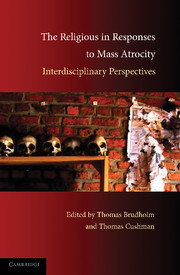Book contents
- Frontmatter
- Contents
- List of Contributors
- Acknowledgments
- Introduction: The Religious in Responses to Mass Atrocity
- Part I Between Necessity and Impossibility: The Role of Religion in the Face of Atrocity
- Part II Does It Help to Import Religious Ideas: Reflections on Punishment, War, and Forgiveness
- Part III Sociologies of the Religious in Responses to Mass Atrocities
- Index
Introduction: The Religious in Responses to Mass Atrocity
Published online by Cambridge University Press: 01 September 2009
- Frontmatter
- Contents
- List of Contributors
- Acknowledgments
- Introduction: The Religious in Responses to Mass Atrocity
- Part I Between Necessity and Impossibility: The Role of Religion in the Face of Atrocity
- Part II Does It Help to Import Religious Ideas: Reflections on Punishment, War, and Forgiveness
- Part III Sociologies of the Religious in Responses to Mass Atrocities
- Index
Summary
There are some deeds that cry out to heaven. These deeds are not only an outrage to our moral sense, they seem to violate a fundamental awareness of the constitution of humanity.
Peter Berger, A Rumor of Angels (1970).So if you want to stay within the religious, you must struggle.
Ludwig Wittgenstein, Vermischte Bemerkungen (1998).For the most part, those who think about the capacity of human beings to commit acts of spectacular cruelty against each other have puzzled over the question: why? The problem of evil has been a central concern of theologians and philosophers and has also increasingly concerned social scientists and historians who have tried to explain the mass atrocities of the twentieth century. There is, of course, no consensus as to how to explain mass atrocity or even on the question of whether or not it can be explained. For some, the pessimistic conclusion, vide Hegel, is that “history is a slaughterbench” and modernity has only intensified its bloody toll. History appears to be a progression of events, some of them quite atrocious, the causes of which are multifarious, but one thing we observe is that in the face of mass atrocity, human societies have developed various ways of coming to terms with the horrific events that so often punctuate their existence. So, in addition to looking for the causes of such events, we must also address the question of how societies respond to them.
- Type
- Chapter
- Information
- The Religious in Responses to Mass AtrocityInterdisciplinary Perspectives, pp. 1 - 18Publisher: Cambridge University PressPrint publication year: 2009
- 1
- Cited by

